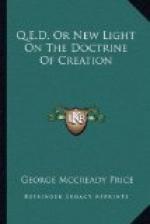The masterly work of Tyndall and Louis Pasteur in doing for the bacteria and protozoa what Redi had done for the larger organisms, is too much a matter of modern contemporary history to need recital here. Upon this great truth of life only from life is based all the recent advances in the treatment and prevention of germ diseases and all the triumphs of modern surgery. The housewife puts up canned fruit with the utmost confidence because she believes in this great Law of Biogenesis. It is because we all believe in it that we use antiseptics and fumigators and fly screens.
III
But what are the lessons to be learned from this great fact, and what bearing has this fact on the old Bible doctrine of a literal Creation?
Life comes now only from preexisting life. But at some time there was no life on the globe. It does not take any great exercise of “philosophic faith,” as Huxley suggested, “to look beyond the abyss of geologically recorded time” and recognize that at this beginning of things there must have taken place a most wonderful event, essentially and radically different from anything now going on, namely, the beginning of organic life. But would not this be a real Creation in the old-fashioned sense of this term? We cannot avoid this conclusion; nor is there anything in either science or philosophy to indicate that this creation of the living from the not-living was confined to one mere speck of protoplasm. It is absolutely certain that it required a real Creation to produce life from the not-living at all; and it is just as reasonable that this exercise of creative power may have taken place in all parts of the earth at the same general time, as the Bible teaches. For if a Being saw fit to create life at all, why should He stop with one or two bits of protoplasmic units? An architect who can make his own bricks and other building material, can surely build what he desires out of these materials. Common sense tells us that, if the Creator really created life in the beginning, He did not stop with a few specks of protoplasm here and there over the earth. The ability to create life from the not-living implies the ability to make full-grown trees or birds or beasts in twenty-four hours, instead of waiting for months or years, as is usual at the present time.
As we have already found regarding matter and energy, so of life. The record in Genesis is confirmed, for modern science compels us to believe in Creation as the only possible origin of life,—a Creation entirely different from anything now going on, and one that can never be made to fit into any scheme of uniformitarian evolution.
IV
THE CELL AND THE LESSONS IT TEACHES




